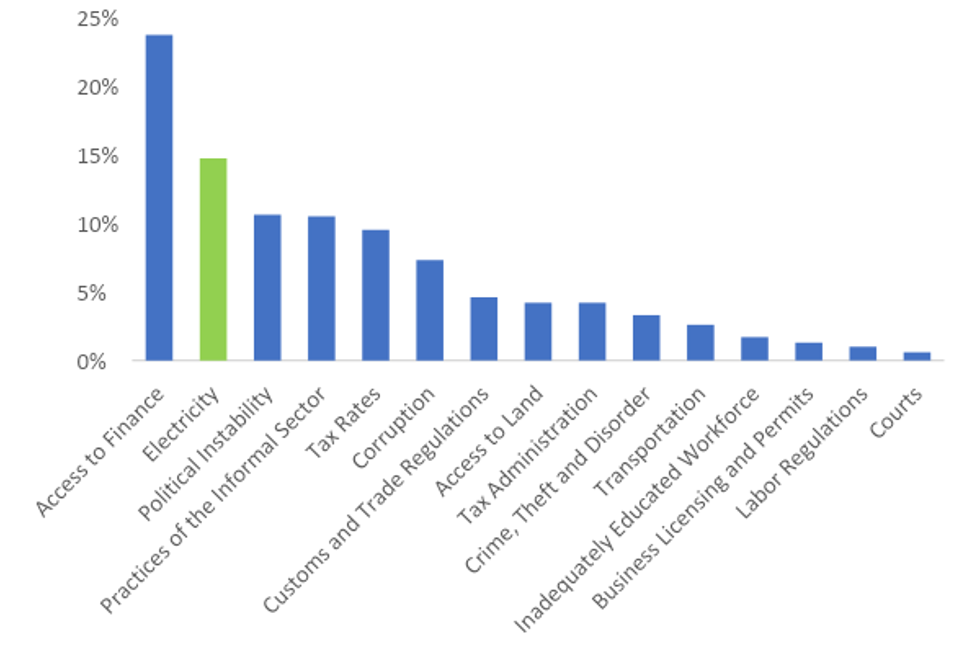Electricity is a critical input for businesses that rely on productivity-enhancing technologies. As a result, firms, particularly small and medium enterprises (SMEs), incur substantial productivity losses from unreliable electricity supply, which is extremely common in emerging market economies.1 Our study finds that, in Ghana, there is essentially no effective method that SMEs can employ to fully compensate for unreliable power supply in power-reliant businesses – and solving this challenge will likely require broader investment or policy intervention.2
Unreliable electricity supply is a major obstacle for firms
More than one in ten firms in Sub-Saharan Africa cite unreliable electricity as the biggest obstacle to their operations (Figure 1). The only barrier cited more frequently is access to finance. Firms report experiencing an average of about 10 outages in a month, with the average downtime for each event lasting about 6 hours. Consequently, about 54 percent of firms in Sub-Saharan Africa use a generator as backup, providing about a third of their electricity consumption.3
FIGURE 1: Percentage of Firms in Sub-Saharan Africa Identifying Each Issue as the Biggest Obstacle to Growth

Source: World Bank (2022). Data from country surveys administered between 2006 and 2020.
How do firms compensate for outages? Evidence from Ghana
Our study on Ghana’s manufacturing sector finds that SMEs lose about 10% of productivity due to approximately 10 outages a month. Firms attempt to compensate for these outages with a variety of strategies:
| SME METHODS FOR COPING WITH UNRELIABLE POWER | |
|---|---|
| Strategy | % of SMEs using strategy |
| Operate fewer hours | 56 |
| Change production time | 48 |
| Switch to less electricity-reliant process | 40 |
| Suspend production temporarily | 28 |
| Use a generator | 27 |
| Start producing less electricity-intensive products | 26 |
| Stop producing electricity-intensive products | 17 |
| Lay off workers | 4 |
| Reduce number of labor shifts | 4 |
| Take out an insurance policy | 3 |
| Change location | 2 |
Source: Abeberese, Ackah and Asuming (2021). Data from authors’ 2016 survey of SMEs in Ghana.
The study’s results indicate that shifting production from more to less electricity-intensive products is the most effective method to mitigate the negative productivity effects of outages. The results suggest that focusing on less electricity-intensive products reduces productivity losses by about 75 percent, while other strategies offer minimal relief. In short, there is no replacement for reliable power in a power-dependent modern industry.
SMEs can be particularly vulnerable to outages
Although generator usage is commonplace among Ghanaian SMEs (used by about ¼ of firms), the findings from the study suggest generators are ineffective at compensating for frequent outages. Interestingly, this varies by firm size: while generators cannot mitigate productivity losses for SMEs, they can help large firms avoid outage-related productivity losses.4
Smaller firms often cannot purchase generators due to their high fixed costs. The cost of acquiring a back-up generator does not vary much regardless of whether the firm will be using it to produce a large amount of electricity or a small amount. Thus, the cost of each kWh of back-up electricity generated is lower for large firms (economies of scale) relative to SMEs.
This makes using back-up generators less cost-effective for SMEs, rendering them particularly vulnerable to electricity outages. This vulnerability is evident in their share of annual sales lost due to outages, which is about 20 percent higher than that reported by large firms.5 Since productivity is key to economic growth and SMEs comprise the bulk of economic activity in developing countries (accounting for about 90 percent of businesses and over 50 percent of employment), unreliable power can have a significant economic impact.6
Our survey results indicate that there is a significant willingness to pay for reliable electricity. Ghanaian SMEs report a willingness to pay a premium of about 12 percent, on average, for uninterrupted electricity. Policymakers may, therefore, have room to invest in grid improvements even if that implies increased electricity prices.
In the absence of reliable grid electricity, policymakers could initiate programs or policies to make it more feasible for SMEs to use generators to help avoid productivity losses from outages in the same way as large firms. This could be implemented via facilitating generator-sharing programs among SMEs, so that the high fixed cost of a back-up generator is spread across a number of firms.
Endnotes
- SMEs are defined as firms with at most 100 workers.
- Abeberese, Ama Baafra, Charles Godfred Ackah, and Patrick Opoku Asuming. 2021. “Productivity Losses and Firm Responses to Electricity Shortages: Evidence from Ghana.” World Bank Economic Review 35(1): 1-18. https://doi.org/10.1093/wber/lhz027
- World Bank. 2022. “Enterprise Surveys.” Accessed May 10, 2022. World Bank. www.enterprisesurveys.org.
- Allcott, Hunt, Allan Collard-Wexler, and Stephen D. O’Connell. 2016. “How Do Electricity Shortages Affect Industry? Evidence from India.” American Economic Review 106(3): 587-624.
- World Bank. 2022. “Enterprise Surveys.” Accessed May 10, 2022. World Bank. www.enterprisesurveys.org.
- Kumar, Ruchira. 2017. “Targeted SME Financing and Employment Effects: What Do We Know and What Can We Do Differently?” World Bank Jobs Working Paper, Issue No. 3.
